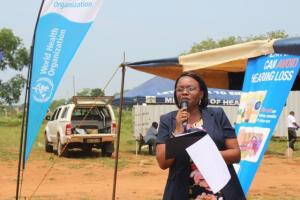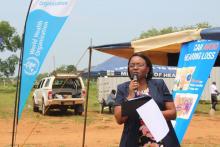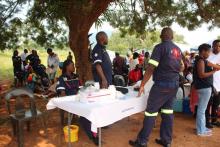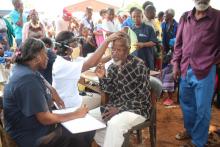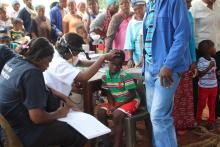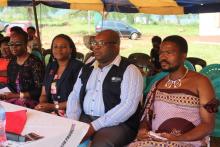Nkwene community gets free services on World Hearing Day
16 March 2017, Mbabane, Swaziland - Hundreds of residents from Nkwene in the Shiselweni region received free ear screening and treatment during the World Hearing Day on March 3. The event was held at Nkwene Inkhundla and was aimed at raising awareness among communities, community leaders, parents, teachers, health professionals, and policy makers about hearing care and how to prevent debilitating hearing loss. The theme for this year was “Action for hearing loss: Make a sound investment”.
The event was attended by among others, Nkwene MP Sikhumbuzo Dlamini, Deputy Director of Health Services-Clinical Dr Velephi Okello, CDC’s Dr Gcinile Buthelezi, WHO Health Promotion Officer Dr Kevin Makadzange and other development partners who provided HIV testing services among others. Ear examination services were provided on site by Ear Nose and Throat specialists from the Ministry of Health. Those with ear diseases were treated.
Speaking during the event, the Minister of Health Senator Sibongile Ndlela-Simelane noted that hearing impairment seems to be on the rise, with a reported 65 000 Swazis living with disabling hearing loss. In her remarks, the Minister who was represented by Dr Okello noted that disease other prevalent diseases such as TB and HIV/AIDS are contributing to the burden of hearing loss. The Minister said some of the people who suffer from hearing loss are those who are HIV positive and have not started treatment, and those diagnosed with MDR-TB and suffer the side effects of the medication used to treat the disease. In some cases hearing loss is caused by loud music or working in a noisy place, injury and ageing.
The minister assured the gathering that hearing loss can, however be prevented. This can done through ensuring that children are immunised against diseases such as measles, mumps and meningitis. Hearing loss can also be prevented by ensuring early detection and treatment of ear infections. The minister noted that children were especially vulnerable and frequently experienced ear problems, hence there is need to be vigilant to ensure their hearing is restored early to allow them the opportunity to participate equally in the community.
The Minister added however, that the ministry of health has prioritised primary health care as an effective approach to the prevention of most common diseases including ear infection and hearing impairment. Among other things, the ministry has recruited six audiologists, two speech and language therapists to work with the Ear Nose and Throat Specialist at the National Referral Hospital in Mbabane. The ministry has also trained school-health nurses on ear care in order to assist teachers and school going children to prevent hearing loss by ensuring that ear infections are treated promptly.
The WHO Representative Dr Tigest Ketsela Mengestu stressed that once hearing has been lost, one can never get it back. Speaking through the WHO Health Promotion Officer Dr Kevin Makadzange at the event Dr Mengestu said about 360 million people (5% of the world’s population) live with disabling hearing loss, mostly in low and middle-income countries. In the African Region, around 4.5% of the entire population lives with this invisible disability which too often goes unnoticed.
“The truth of the matter is young or old, once you lose your hearing you can never get it back. Hearing loss is however preventable. Primary health care interventions are the most effective. Simple strategies include immunising children against childhood diseases such as measles, meningitis, rubella and mumps, and immunising adolescent girls and women of reproductive age against rubella, which will greatly reduce the risk of congenital hearing loss among babies,” she said. Dr Mengestu commended the government of Swaziland for making vaccines available at all health facilities free of charge. She urged parents, caregivers and everybody to make sure that all children and adolescent girls get these lifesaving vaccines which also help prevent hearing loss.
The WHO Representative further reiterated the organisation’s commitment to supporting the government of Swaziland in addressing ear care and hearing loss. She also called on the government, all partners and individuals to allocate suitable resources to address hearing loss. “Investing in hearing loss is a sound investment. Inaction comes at a high cost,” she emphasised.
For more information contact : Dr Kevin Makadzange– HPR officer ; World Health Organization—Swaziland Country Office, P.O. Box 903, 2nd Floor, Lilunga House, Somhlolo Road, Mbabane, Swaziland. Phone : (+268) 24042928, 24049635, fax : (+268) 2404 4566 email: makadzangek [at] who.int
Below:
01 - Deputy Director of Health Services-Clinical Dr Velephi Okello delivering remarks of behalf of the Minister during the event
02 - The Emergency Medical Services team present at the event
03 - Community residents getting free ear screening from the ENT team
04 - Community residents getting free ear screening from the ENT team
05 - Dr Gciunile Buthelezi, DDHS-Clinical Dr Velephi Okello, WHO HPR Officer Dr Kevin Makadzange and Nkwene MP Honourable Sikhumbuzo Dlamini following proceedings during the World Hearing Day at Nkwene



